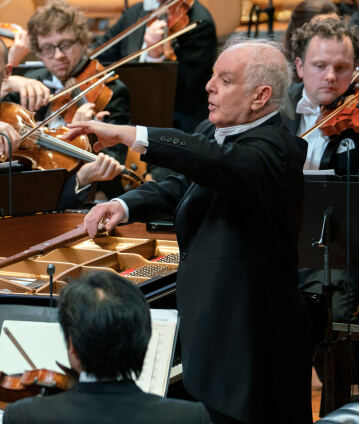2018 New Year’s Eve Concert with Daniel Barenboim

The conductor of this New Year’s Eve concert is Daniel Barenboim, one of the Berliner Philharmoniker’s oldest friends. He also takes on the role of soloist in Mozart’s Piano Concerto No. 26 – a work of sparkling beauty and nuanced expression. There are also four famous works by Maurice Ravel, which create an impressive synthesis of elegance and originality. The final highlight is the Boléro, perhaps the most stunning crescendo in music history.
When Daniel Barenboim first appeared as a guest soloist with the Berliner Philharmoniker performing Béla Bartók’s First Piano Concerto on 12 June 1964, he was only 21 years old and at the beginning of a stellar career. Since his spectacular debut, the general music director of the Staatsoper Unter den Linden and the Berliner Philharmoniker have enjoyed a long-standing artistic partnership, and since he made his conducting debut in June 1969 with works by Haydn, Beethoven and Schumann, he has also regularly appeared at the helm of the orchestra. For this year’s New Year’s Eve Concert, Daniel Barenboim has selected music by Maurice Ravel and Wolfgang Amadeus Mozart – the latter’s festive Piano Concerto in D major K. 537, with the maestro himself as the piano soloist. A subtle combination as Ravel revealed in his Lettres, published posthumously in the Revue de Musicologie in 1956 with regard to his understanding of Mozart’s music: “He [Mozart] confined himself to saying that there is nothing that music can not undertake to do, or dare, or portray, provided it continues to charm and always remains music.”
The fact that Ravel wanted to “charm” is evident in his compositions – for example, in his “Iberian” orchestral piece Alborada del gracioso which is named after the buffoon of 17th century Spanish comedy. His morning serenade is accompanied by a sophisticated imitation of a guitar and evocative tambourine and castanet sounds. Another picture of Spain is created by the orchestral meditation Pavane pour une infante défunte, in which Ravel combined the ceremonial courtly dance with the idea of a beautiful princess who has died: with unexpected plasticity, the music conjures up the world of Castilian-Habsburg court ceremonials or the fascinating ambience of the Escorial Palace of Philip II in the mindʼs eye of the listener. With the Rapsodie espagnole, Ravel created a brilliant orchestral triptych whose first two movements Malagueña and Habanera are named after Spanish dances. In contrast, the final Feria refers to fairs in the southern French-northern Spanish border area, which are associated with suitably exuberant music. Of course, such an evening has to include Ravel’s breathtaking Boléro whose mesmerising effect draws the listener in from the almost inaudible basic beat of the small drum at the beginning to the gigantic apotheosis of all orchestral instruments at the end.
© 2018 EuroArts Music International
Related interviews
Category
Artists
Our recommendations
- 2001 New Year’s Eve Concert with Daniel Barenboim and dance music
- 2024 New Year’s Eve Concert with Kirill Petrenko and Daniil Trifonov
- Seiji Ozawa conducts Orff’s “Carmina Burana” at the 1989 New Year’s Eve Concert
- 2023 New Year’s Eve Concert with Kirill Petrenko and Jonas Kaufmann
- Karajan conducts Beethoven’s Ninth Symphony at the 1977 New Year’s Eve Concert
- The 2011 New Year’s Eve Concert with Simon Rattle and Evgeny Kissin